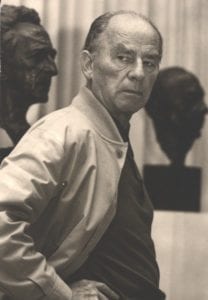 A historic interview conducted by Andre Müller in 1979 with Arno Breker, Hitler’s favourite sculptor
A historic interview conducted by Andre Müller in 1979 with Arno Breker, Hitler’s favourite sculptor
Artist Arno Breker became notorious as Hitler’s favourite sculptor during the Nazi years, when he took on commissions from National Socialist government, created heroic, monumental figures and led Hitler around Paris. The first solo show of his sculptures in Germany since World War II opened July 22 in Schwerin, prompting much discussion on how Breker’s works should be shown today (review here). On this occasion we have translated a lengthy interview with Breker conducted in 1979 by Andre Müller, one of the most respected interviewers of his generation.
Interviewer Andre Müller introduces this discussion with sculptor Arno Breker with the following words:
During this interview, which was conducted at Breker’s Düsseldorf home, his wife and his art dealer, Joe F. Bodenstein, to whom the artist is bound by contract, were in attendance. Each of them interrupted the conversation a number of times to prevent the discussion from centring for too long on the topic of the artist’s political situation. Breker himself made no objections. When he mentioned the tragic consequences of his professional activities under Hitler, his isolation and desperation, his wife trembled with laughter. When I asked her what she found so amusing, she replied that normally her husband spoke in a completely different way. During a stroll around the garden, where several sculptures dating from the National Socialist period were on display, she told me: “I don’t listen when he tries to discuss politics, it bores me.” A macabre incident occurred when I asked the sculptor about his attitude toward the gassing of the Jews. Precisely at that moment, Bodenstein inserted a new tape into his recorder and mistakenly pressed the play button, so that my words were accompanied by a few bars of dance music. The autobiography mentioned in this interview first appeared in French under the title “Paris, Hitler et Moi.” The title of the German edition is “Im Strahlungsfeld der Ereignisse” (In the Radiation Field of Events). Breker’s first sentence when I mentioned the subject I wanted to discuss was: “I’m not afraid of politics.”
Andre Müller: Reading your autobiography, I have the impression you’re immensely dissatisfied. What’s the source of this dissatisfaction?
Arno Breker: You know, you can’t just say all the time that I made my large figures out of sheer perverseness. My artistic situation has been completely devalued by political history, cast in a false light. I don’t make large figures out of megalomania, as many people assume.
I don’t assume that. But I will say that your figures are expressions of your client’s, of Hitler’s megalomania.
That’s not true. That’s mistaken. I became close to him only very late, in 1936, when I won the silver medal in the sculpture competition at the Olympic Games. In the beginning, I wasn’t even participating in the competition. But the president of the committee, an Italian, knew my work and came to Rome where I was living on a scholarship from the German Academy, and said to me: I don’t have anything from you. That’s how I came to participate.
That does nothing to invalidate the assertion that you produced sculptures on commission from Hitler which gave expression to the regime’s ideology. Alexander Mitscherlich called this ideology “infantile fantasies of omnipotence” lacking any basis in reality. Wasn’t it all doomed to failure from the very beginning, based as it was on unreal assumptions?
No, look at the redesigning of Berlin, which I participated in. That wasn’t unreal. There are precedents from ancient history, from antiquity. They also made large buildings back then. Hitler was compelled to redesign the city as a consequence of increased traffic flow. New axes had to be created.
To what purpose?
To channel the traffic. He also began building highways for purely technical reasons related to traffic flow.
Yes, in order to create routes for his tanks.
As to that, I can tell you the following. We were planning something quite large, a grand arch sketched by Hitler when he was in a military hospital after being wounded in World War I, and for which I was supposed to design the figural decorations and reliefs. He never called it a victory arch, always a grand arch. Now here’s the important thing: Hitler had conceived the arch on a scale that was typical for the time, around 30 meters in height. The Arc de Triomphe in Paris is 40 meters high. But then there was this massive axis through Berlin, which called for an appropriate terminus, so Speer raised its height to 120 meters.
Against Hitler’s intentions?
No, but it was meant to be a surprise. It was now so large that the Arc de Triomphe could easily have fit into the passageway. But then the following happened: although the arch had now acquired these new dimensions, Speer was intent on slavishly adopting the old architectural plans. We had a talk. I’m an architect by training, and I told him it couldn’t possibly be done like that. If the arch is 120 meters high, then the architecture must have a different design. But Speer said: There’ll be no talk, it stays like that. And then a model was prepared. We had a marvellous team of sculptors, who fashioned it in such a way that it was just like standing in front of the finished city. Hitler came right from launching the “Deutschland” battle cruiser, and he was really moved by this structure. It flattered him. He said, look here, the entire new design costs as much as a single battle cruiser, but in perhaps three years time, the battle cruiser will already be scrap metal …
And the same was true of Berlin. But I want to get back to the question of your dissatisfaction. Today you are one of the busiest sculptors in Germany. Soon after the war, despite your National Socialist past, you were already receiving large architectural commissions. In the early 1950s, you were chief architect of the Gerling Company. Why then this sense of dissatisfaction?
Well, of course, political defamation had consequences.
Such as?
Such as the idea that I had nothing more to express as a sculptor. In 35 years, I received only two official commissions.
But certainly that has nothing to do with defamation. Your expressive force was lost because the regime to which your aesthetic mode of expression was so well suited now lay in the past. Surely it’s naive to think the Federal Republic of Germany would award you commissions on the same scale as Hitler, who led this country into the abyss?
I fail to see why an artist has to be somehow political, just because he’s received a commission. In that case, Hitler’s favourite firm, namely Mercedes, would no longer have any right to exist.
But Mercedes is a private enterprise.
I am also a private enterprise.
Yes, but you expect the state to give you work. As a private enterprise, you have enough customers to provide you with a secure life. Why then do you want state commissions?
I don’t want anything. I want peace and quiet, you understand? I’ve done nothing that went against artistic values or the dignity of the artistic vocation.
In what way have you been harassed then?
After the war, I could no longer exhibit. I was simply no longer invited.
Well then you had the peace and quiet you desired.
Pardon me, but I lost everything with the German defeat.
But you gained peace and quiet.
Yes, but peace and quiet alone can’t keep you alive. Sculpting is an enterprise requiring a great deal of money. You need models. You need plaster casters. You need bronze casters. Fortunately I’d studied architecture, and was able to live for 12 years designing for Gerling.
Did you have financial difficulties?
Yes, of course. During the third Reich, the fees I received were just enough to cover necessities. Speer told me the taxes were so high they would devour everything, and that I should wait until after the war to collect my fees. But after the war they were gone. When we had to flee Berlin, we had the 100,000 Reichmarks my wife had been able to save, and we deposited them at the Bavarian Hypothekenbank in Starnberg. But then it was confiscated by the state of Bavaria. So that was gone too. Then there was also the fact that I was denazified only very late, and by one of the strictest officers, a communist who’d been spent a long time in a concentration camp.
Fair enough, everyone was poor back then, for understandable reasons.
I don’t regret that I was poor. I come from a modest background, I’ve always known how to economize. Up to the present I’ve never taken vacations, and I’ve never had a passion for big cars or beautiful horses or glamorous women.
Which makes it all the more difficult for me to understand your complaints.
After the war, I lacked the resources needed to develop further.
So did everyone else. Surely you can’t expect that a country that had suffered such a defeat – and, moreover, for which it alone was responsible – could simply keep going as if nothing had happened?
Yes, that is difficult to accept.
The defeat?
No, the personal consequences.
Yes, that’s difficult. In such a situation, there are only two possibilities: one you live out the despair, or you repress it.
I suffered my first heart failure at the time.
In 1945?
Yes, after the defeat. If not for that, we wouldn’t be sitting here today. I’d received a series of offers to go abroad. When the war was over, I immediately received invitations from Peron, Franco and Stalin. When Stalin invited me, the American NATO general came to Bavaria personally to take me to Russia. That’s how much respect the Americans had for an offer like that.
It’s most illuminating that your art was appreciated so highly by dictators. But for now I’m more interested in your psychological state at that time. What was the source of this irrepressible drive to fling yourself immediately into your work, as though nothing had even happened?
I’m a vigorous worker, and I had a lot of ideas I wanted to realize. The sculptor Despiau, who was a friend of mine, once wrote a book about me which ended with a sentence expressing his amazement at my formidable stamina.
Do you know Mitscherlichs’ book “The Inability to Mourn”?
I mourned mightily.
What about?
About the defeat and the collapse of Germany. But there’s an aspect to this collapse you’re not aware of. We owned a house about 75 km east of Berlin, it was our refuge during the war. I could no longer work in Berlin, and my three Paris studios had been damaged by bombing raids. So we moved to the country. Then came the first attempt at Russian penetration. The attack was repelled, but at half past eleven we got a call from the Nazi district officer telling us we had to abandon everything within half an hour. We departed amid heavy snowfall. I had no idea why we had to leave so suddenly. I thought we’d be able to return the next day. As we sat in the car, Speer said: That’s out of the question. My wife asked me: What do you think? I answered that I felt liberated from my crushing work schedule. I’d been under pressure to finish the sculptures for the great arch.
Had Hitler put pressure on you?
No, never. He never pushed me, never gave me any kind of instructions. Everything I did, I did in complete freedom and under my own responsibility.
I’d like to confront you with a text you wrote in 1940. It appeared in a brochure about the construction of the Reich Chancellery in Berlin. There, you wrote the following about your work with Speer: “No discussions, no trials preceded our work together. Speer gave the marching orders in Prussian style, and we met again when our results were integrated into the larger organism…”
Oh, you’re going back to my first commission?
Yes, for the sculptures for the Reich Chancellery. Someone else gave the marching orders, and you were only there to execute them.
No, no, look here, I’ll explain it to you. I’d like to tell you exactly how things were. I’d already wanted to offer my talents to Speer, I wrote him letters then tore them up and threw them into the wastepaper basket, never even sent them. Then suddenly I got a call, he wanted to speak to me. So I went to him, and he took me into the Academy of Arts, and I went inside and saw an architectural model which I considered highly successful, an inner courtyard with very good proportions, good profiles, restrained profiles, and so on. It was a model of the court of honour for the Reich Chancellery. I liked it, and I saw the two blocks on each side of the the staircase leading to the entranceway. My figures were to make sweeping gestures away from the entrance, and to have a relationship to the building. I could hardly install Adam and Eve there. In my view, the only sensible embellishment was to set a spiritual man on one side, symbolized by a flame, and on the other, the defender of the country, a man with a sword. So I set to work on it at home, and came back two weeks later with my sketches. They were displayed, and Speer didn’t say much. Then we parted. He immediately called Hitler, who saw them and was instantly enthralled. The names of the figures, “Party” and “Wehrmacht,” were his invention.
Good. So much for your story. But your text goes further. You write: “I perceive in this uncompromising collaboration the first elementary, energising heartbeats of a new style, one that can only become actualized in the intact community of equal natures, unified by the march set by the greatest renovator and perfecter of German being.” So once again, no talk about artistic freedom, but instead orders and marching.
I’d like to tell you the following. Listen carefully. I come from the Ruhr District. I studied there, experienced the total political disintegration after World War I when everything was destroyed. A little bit more and it would have been utterly destroyed. Then I turned the page, went to Paris, and made a new start there. The really big spiritual crisis came not after World War II, but after World War I. Things went so far that people wanted to burn down the museums, because they felt the entire past, and art as well, were responsible for the war and its aftermath. And then someone came along with a real concept. I didn’t experience Hitler’s rise to power, the rise of National Socialism that is, because I was in France at the time.
But you did experience how he organised the “Degenerate Art” exhibitions. You’d been back for a long time by then. And among the artists affected were many you held in esteem. How did you feel when these artists were defamed and banned?
You mean the business with Hausenstein?
What business?
The art historian Hausenstein, who was a friend of mine, came to see me in Rome and said: You’ve got to come back to Germany and save whatever can be saved. He meant I should bring my influence to bear, and in fact I was on the jury for the first Great German Art Exhibition in Munich.
Despite that, you did acquiesce to the “degenerate art” action. Why did you continue to obey a political system that did such things?
If I had opposed Hitler, I wouldn’t have been able to help my persecuted friends. I saved Hausenstein’s wife from imprisonment. I got Maillol’s Jewish model out of prison, and prevented Picasso from falling into the hands of the Gestapo.
Did you ever consider leaving Germany?
Yes, repeatedly. Later, there were great disappointments, because in 1943, the situation really did become grim. But where would I have gone? I had my studio here, my work. The most important thing for me was my work. I thought only of myself and my work.
I want to come back to the shock you suffered after the war. What was the immediate occasion for your collapse?
The Americans had destroyed 90% of my Berlin sculptures, and my money was gone.
Wasn’t it far worse to witness the destruction of the ideals in which you had believed for 10 years?
Yes, they were gone. My ideals, that is, everything that had driven me to execute the monumental sculptures, that was gone. On this subject, I must tell you about my artistic development. In Paris, I was still strongly influenced by Rodin. But through my own work I realized that Rodin’s sculptures lacked volume. His surfaces were dissolved. They never had the effect of light and shadow I was after. The volume is the place where a sculpture captures light and shadow. So the volumes must be shaped with great clarity. That’s how I arrived at my sleek, monumental forms.
And that was exactly what Hitler wanted.
No, at first, not at all. In the beginning, the National Socialist press didn’t support me at all. I didn’t know what Hitler wanted. I had never read “Mein Kampf.” The contents of my art were entirely my own affair, there was no political background.
What kind of background did they have, if not a political one?
The origin of my sculptural work is the beauty of the human body. My human forms are always intact. I come from a very wholesome family that was strongly influenced by Christianity on my mother’s side. My grandfather was a minister. I had a fantastic family life. We were a marvellous entity. My father was a highly gifted sculptor, who was derailed from the profession by fate, so to speak, because his father died young, and he had to feed a family of seven. For him, I represented the overcoming of his unhappy fate, because I achieved what he had aspired to.
So your task was to compensate for your father’s failure?
I wouldn’t put it like that. My affinity for beautiful bodies had other origins. The strengthening of the body, the vitality of sports and the prevalence of sports, a hunger for nature, even for a culture of nudity, nude bathing out of doors: all of these things are elements of the feeling of being safely enclosed in a shell, in which we travel through the world.
So nude bathing was an important source of beauty for you. That’s certainly quite consistent with the kind of twaddle the National Socialists liked to peddle to people: that everything would be grand, that a thousand years of paradise was just around the corner. A couple of years later, everything fell apart. What happened inside of you then?
I entered a clinic, and wasn’t able to work for a whole year. I was totally debilitated.
Did you experience anything like anger against the regime, or against the people who had deceived you so dreadfully?
May I say the following: in Berlin during the war, we had many parties, and at every one, politics was discussed, which I found nauseating, because it was always the same thing. But I was fortunate enough to have access to music. I was on a first name basis with Wilhelm Kempff and Alfred Cortot. My brother-in-law is a pianist. Elly Ney was also a friend of mine. So to avoid all of that, we had only musical evenings. On one of these evenings the situation in Stalingrad was acute, and people were terribly agitated. Speer was there, and so were some other government ministers, and I said to Speer: either you people know a way out of this situation, or else you’re all criminals.
That’s hardly an answer to my question. I want to know what you felt in 1945 when you realized that these people with whom you’d been together on a daily basis had murdered six million Jews. Was your image of the human being still perfectly intact? Or did you repress it all?
Today I’ve repressed it. Today it’s gone. Because I’m still living, and I have the drive to develop further. Last year I had a heart attack, but after eight days I already had my sketchbook with me under the covers.
Did you continue to produce the same heroic figures after 1945, or did the contents of your sculptural work change?
No, not at all. Look here, I’ve got a problem right now. I’ve received an invitation from Greece to produce a monument to Alexander the Great. Of course, It’s a wonderful thing for me. But I’m 79 years old. I can no longer produce figures that are 10 meters tall. I’m restricted by my age. But the theme, this look, it still fascinates me.
Nevertheless, it’s possible that your conception of the human form underwent a change. It’s not purely a question of the size of the figures. Did you ever produce after the war the kind of giant statue you made for the National Socialists?
Excuse me… you’re assuming once more that a political component was in play.
No, I am assuming that personal experiences can alter an individual’s world picture.
About that I can say: I’ve just made a sculpture of Europa. In political terms, I have only a single concern: the association between Germany and France. If these two states come together, everything will be fine. As far as my picture of the world goes, it has remained unaltered despite the catastrophe, or has slowly recovered after the catastrophe.
What was decisive for this recovery?
My enthusiasm for people, for beautiful people. Last Sunday, I watched a tennis match. The six or seven players I saw would have been superb models for me. When I look at these athletes, I feel confirmed in my point of view. My ideal image of humanity is reinforced. Alongside the other kinds of proportionality, shouldn’t the artist disclose the inner beauty of the human form before all else? I’ve come to realize that the man who is outwardly perfect is also inwardly beautiful. I had such a perfect man available to me in the decathlete Gustav Stührk. He was the model for most of my male nudes.
Could you also talk with him?
Yes, of course. He was highly-educated. You can visit him in Munich. He’s still alive. I’d be happy to give you his address.
If he really was a brilliant man, then you failed to capture his intellectual qualities in your sculptures. Have you ever done a bust of him?
No, never.
So you were only interested in his body?
Yes, he was the best-looking athlete in Germany at the time. And above all, he was a decathlete. Decathletes are uniformly developed. Tennis players aren’t developed like that, neither are sprinters. They have well-developed muscles in their legs, but the upper body and arms are not correspondingly well-developed. But these are really specialized requirements. I aspire toward the divine, the perfected human being.
Does this mean that with divine humans, breast and leg musculature must always be in harmony?
Yes.
But then Gerhart Hauptmann, for example, whose portrait you did, was not divine, nor was Cocteau. He was rather thin.
No, you see, in order to look like Stührk, you have to do physical training. An intellectual type like Hauptmann, who writes books, can’t possibly spend enough hours every day cultivating his body. That’s why in antiquity, they modelled their heroes and emperors not as whole figures, but instead set the heads of emperors on muscular statues that has been done previously. I’m quite sure Pericles was no athlete, nor Socrates, but they certainly had interesting heads, and because the Greek sought wholeness, they set their heads on the bodies of athletes. In their studios, the sculptors had breast pieces with splendid drapery folds, and above was a space, a cavity where a head could be inserted.
Then you should have set Hauptmann’s head on Stührk’s body. But Hitler might not have liked that. Your mistake is to perpetually confuse Ancient Greece with National Socialist Germany. The political situation and the situation of art in Germany were totally different from those in antiquity. You’ve described the situation in your autobiography. There was a gap between the people and the artists, and Hitler, in order to draw close to the masses, attempted to bridge the gap. He eliminated the artist and heralded a utilitarian art, that is to say, he sought to channel that which you refer to in your book as the “stream of average talents” into a solitary, officially sanctioned direction.
Yes, there he was mistaken.
How so?
In setting this direction. He admitted this to me later on. He wanted me to straighten things out. He told me himself that he’d been wrong. Hitler was an artist by nature, and he had no reservations against French culture, as many people believed. And if fate hadn’t driven him into the arms of politics, he would have become a painter. The measures he took in the area of the arts had purely political motives. You simply have to understand how things were. As a politician, he wanted to bring art closer to the people, and he could only do that with the help of artists with an intact image of the human form. He turned away only from those who transformed the image of the human form, to an extent destroying it, occasionally disintegrating it. He resisted this. His mistake was to have thrown out the baby with the bath water.
I refuse to accept your attempts at justification. There are no excuses. Inexcusable things happened. What I do accept is your distress, your despair, your attempts at reflection.
Perhaps you think I don’t suffer? You won’t get a photo of me smiling today. I can’t smile into the camera any more. You should write: Breker has been deserted by laughter. I’m a beaten man, a victim of the times. I’ve been totally deprived of the impact of my artistic achievement. Fifty years from now, when someone looks at my figures impartially because the political point of reference will no longer apply, then my works – and your presence here shows their actuality – will be seen for how I depicted arms and legs and human beings in general. And then I will be understood.
You can have that kind of understanding from me already today. I have no ulterior political motives when I find the sculptures you made for Hitler repellent.
What don’t you like about them?
Their cold, necrophilic aesthetic, the ludicrous poses, the primitivity of expression.
Fair enough, it’s a question of perception.
I’m not reproaching you for having worked for the NS state, but because even today you remain blind to certain things expressed in your works.
You’ll have to be more precise.
I mean you do not see any difference between your early things, the ones produced in Paris, and the sculptures for the new Reich Chancellery, for example.
All right, then you would have to say that I went in a false direction by moving away from studio pieces and turning to public sculpture. I wanted my sculptures to have an impact on the public. In order to do so, they required architecture, and, so to speak, urbanistic features. I wanted to pursue the figure in an architectonic direction. My earlier works were influenced by Rodin. Later, I found my ideal in the Greeks.
There is absolutely nothing Greek about National Socialist buildings. This pseudo-Classicism has nothing whatever to do with Ancient Greece. But I realize I can talk for hours, I’ll never be able to get anything across to you. You were under influences, no matter which ones, and you excelled at delivering what was required of you. Take your figure “Die Flehende” (Supplicating Woman), for example, created in your Rodin phase. What were you trying to express there?
I wanted to show that there are abysses that human beings are unable to overcome. She begins to pray, to make an appeal, to return from total isolation to normality, to enter a protective atmosphere.
And as a comparison, your sculpture “Bereitschaft” (Readiness), which crowned Berlin’s Mussolini Memorial. What is expressed there?
My model was Germany’s youth, who were soldiers in body and soul. That really made an impression on me.
Were you conscious of the political symbolism of these sculptures?
No, my work is too realistic for that. My point of departure is the human form. I am guided solely by the human image.
Here, I really must confront you, once again, with something you yourself wrote. “The obsessive will to immortalize National Socialist Germany through native cultural creations has been realized in a grandiose manner. The path toward the representation of form develops with elementary fury… The building as such is a symbol of our political situation and of our world view… Here, this symbolism speaks its most convincing language… The rooms are aglow with the fire of political power…” And so on and so forth.
Where’s that written?
In the same brochure I cited earlier, the one on the construction of the new Reich Chancellery.
No, I didn’t write that. I’m anything but a coward. I stand by what I’ve done in my life, I have a clear conscience, I’ve helped persecuted people, I’ve helped Jews, I saved Picasso from being arrested … but I’ve never spoken in such a bombastic manner. That’s not my style. You got that from the newspapers. I can’t possibly have written that. My orientation was entirely French, that is to say, what the French refer to as ‘mesure’, good measure in judging all things. If you want to condemn me, Herr Müller, you’re doing a good job. Politically, that’s exactly what’s in vogue today.
But I’m not condemning you at all. I’m only trying to make you aware of what happened back then, to your own benefit. An artist can’t create out of repression. Whether you wanted to or not, you fulfilled the intentions of your client with exactitude. That’s not a reproach, it’s a fact.
Michelangelo received commissions from the popes.
Yes, but above all, he had an idea. He didn’t adopt the ideology of the papacy as the content of his creative work. On the contrary, he used the papacy to realize his own conceptions. No one denies your technical abilities. What distinguishes you from Michelangelo is the absence of any idea. That’s why you’ve been so incapable of resisting all manner of external influences. After the war, you suddenly began to do abstract work again.
I made abstract things after World War I, in the wake of the shattering experience of defeat, when the human image had nothing more to say. At the art academy in Düsseldorf, where I studied, I was considered to be on the Left. Unfortunately, all of those things were lost. You’d be amazed at the fantastic abstract works I did back then.
I’ll take your word for it that in the wake of events you functioned very well. You also produced abstract works after World War II.
No, not after World War II.
Of course you did. There is the “Gewandfigur” (Robed Figure) you made for Mannheim, and the figures of girls in the 1950s, those are very stylized.
In Mannheim, I had to adapt to the given architectural conditions. The building had a completely smooth facade.
That’s what I’m saying: you’ve always conformed to existing conditions.
That goes without saying. I’m a visual person.
All right, but then it’s not really correct to say you made the same kind of things after the war as you did under Hitler, namely heroes.
Look here, I wouldn’t have made so many heroes if I hadn’t had to produce the reliefs for the grand arch in Berlin. It was to have been a memorial to German warriors of all historical epochs, it was conceived in their honour, so I was confined to a very narrow framework, it took me a long time, because construction work could only be started once the reliefs were finished.
So Hitler wanted heroes, and you delivered them.
Yes, what was I supposed to do? Tell me someone who would have done things right.
It’s not a question of right or wrong, but of giving some thought to the causes when you’ve become as entangled as you were.
You’re preaching to the choir there. Look here, I myself want to be finished with these things, with all of these problems. But for that, I would need time and quiet. My commissioned activities are not so great that I could speak of financial independence. I live from hand to mouth. Just consider the cost of bronze casting. With a larger sculpture, you have to reckon with 40,000 marks just for casting alone. Today, the bronze caster drives a Mercedes, but not the sculptor.
I wouldn’t say that in your place. First of all, you do drive a Mercedes. Secondly, you don’t necessarily need to insist upon making such enormous things.
Look, if you’re a sculptor with a penchant for the monumental, now and then you have to produce a large sculpture. It’s only human. You could call it human weakness. The impulse toward monumentality is a part of me. The monumental is my sickness. I’m always delighted to see a successful monumental sculpture, whether it’s Michelangelo’s David, or Andrea del Verrocchio’s statue of Bartolomeo Colleoni, or the Venus de Milo.
But none of that is comparable to the sculptures you made during the NS era. The monstrosity of your figures is not merely a function of their size, but of their habitus, their cramped pathos.
You’ll have to define that more precisely.
I hinted at it earlier. The roots of your susceptibility to National Socialism lay in the fact that failure never manifests itself in your image of humanity. Of course, that suits the Nazis, for whom the possibility of defeat had to be repressed. There was the ultimate victory and the Thousand Year Reich, and right up to the end there was the possibility of a meaningful death for the sake of this phantasmatic empire. In this way, quasi-religious sentiments of sacrifice replaced fears of death, and out of gratitude for this liberation from the pressure of fear, millions of people allowed themselves to be slaughtered. In reality, human existence is a thoroughly broken one, full of hesitations and doubts.
Not for me. There is no hint of decadence in me, you know.
Human doubt, fear, ambivalence, you call that decadence?
The disintegration of the human image, as we are experiencing it today, that is undoubtedly a manifestation of decadence.
Then Michelangelo was also decadent. Virtually no one else ever gave form to human imperfection in such a harrowing way.
Listen, in Michelangelo’s case, there were purely technical reasons. There was a series of figures he wasn’t able to complete. He wouldn’t have left them unfinished if the pope hadn’t compelled him to work on other commissions.
I’m not talking about the incomplete works, but about the element of incompletion in the finished works.
There is none.
I disagree. Take David for example. It’s quite large, obviously, but it entirely lacks the tacked-on triumphalism of your heroic figures.
Look, the kind of relaxed stance we find among the Italians, it never existed among northern peoples. Christianity expunged the motif of the supporting and non-supporting leg, because it called the worldly sphere into doubt, transporting it to another plane.
Yes, to the level of a stability that is possible only in the ideal or in the divine. But Hitler was no God, even if he perhaps liked to pose as one.
I’d to say the following about that: clarifying that remains a matter for historians. This is where words come in. You need the distance of time, a voltage curve lasting a few months, in order to formulate that. I can’t discuss such a far-reaching things with you now. I’m not prepared to do so. I’m not an author, not a man of words.
Do you find it insulting when I characterize you as an artisan?
No, not at all. I come from the crafts, my father was a stonemason, and the artisan is hardly a rewarding object for psychologists. I have a friend, he’s the director of an insane asylum, his name is Heinrich, a highly gifted man, he gave a speech at the Rotary Club on schizophrenia among artists. I said to him: there’s one profession you’ve left out, the sculptor. If you look at history, you’ll see there are no schizophrenic sculptors, because sculpture comes from the handicrafts, and has a completely different basis, for example, than music or poetry. Just consider the degree of schizophrenia Richard Wagner managed to attain. Just read the diaries of Cosima Wagner: what a titan of neuroses! It’s exactly the same with painters and writers. Many authors have been psychopaths. We sculptors, however, are too close to the material. We have to deal with stone, with the material. The overcoming of the material is a monumental task, one that challenges me from the moment my day begins. If you like, you might classify me among the naive.
Precisely that is the tragedy of your life. Because you arrived at a time when there was only one thing that was entirely impermissible, namely being naive.
I wasn’t in a position to choose the moment of my birth, otherwise I would have waited.
Or better: set the date back in time.
Fair enough, there was Rodin, and before Rodin there was Carpeaux, also a giant, and afterwards came Maillol and Despiau, and today, its over. Today things are quiet, the quiet before the storm. Today, humanity is only occupied with various materials. Someone takes a piece of railroad track and sets it on a lawn, and that’s supposed to be art.
It bespeaks a profound scepticism about inherited values.
Really?
Yes, it must have some reason for being. There’s no more trust in the order of things, in the health of the world.
Well I have it. My relationship to humanity is unbroken.
You see, that’s exactly what I’m unable to comprehend, after everything that’s happened, and after what you must have experienced.
If I may reply in a rather grandiloquently way: in this context, I am a real phenomenon.
In which context?
To be able to see people the way I see them, despite everything.
In fact, it’s phenomenal, an impressive kind of obstinacy.
I don’t find it at all obstinate. It’s just how I am. The French like to say; c’est a prendre ou a laisser, take it or leave it. I was recently in Paris again, and I went to a fruit stand, there were bananas there, all the same size, but with different prices. I must have had a funny look because the seller said: c’est a prendre ou a laisser, either take it or else leave. That’s how it is. That’s how things are. I see something that irritates me, and I try to fathom the reason for the irritation, and then I’m rebuked by the seller, who was observing me.
Then why did you put up with it?
What was I supposed to have done? Should I have said: I don’t understand why they have different prices? Then I would have had to endure a longer explanation. That wouldn’t have done any good.
You never know until you try. Maybe it would have irritated the banana seller. No one stop you from reflecting.
He was so categorical. I just tipped my hat and left.
That was a mistake. But I don’t want to delve into that right now. I want to come back to the question of how you manage, after all the experiences you have behind you, to hold onto your healthy image of humanity. What significance does the gassing of the Jews have for your thinking?
I can give you a very simple answer. I belong to the so-called believers. The Jews, that is to say, the fact of the Jewish people, is a part of the history of creation. No one has the right to interfere with the history of creation, whether it’s a question of millions of deaths or only a single one. That’s my point of view.
When did you learn of the gassing for the first time?
After the war was over. If I’d known earlier, I wouldn’t have been able to work. Not a single word was ever spoken about the concentration camps. I lived like a pure fool during this period. I lived for my work alone. It was really a formidable achievement in terms of sheer volume. I won’t say anything right now about the quality. I worked, and that was all. I was completely blind to my surroundings.
In retrospect, how did you reconcile yourself to having befriended people who turned out to be mass murderers?
I was never a friend of Hitler’s. Nor was I, as people always say, his favourite sculptor. That was Thorak. For years, Hitler didn’t want to know anything about my work. And I only received the commission for the Reich Chancellery because he had rejected the proposals of his favourite sculptor. Speer said: Führer, I don’t know what to do next. Hitler replied: Why not try Breker? I only had one an intensive conversation with him. It was on the day the peace treaty was signed with France, after I’d shown him around Paris. After dinner, he came outside, I was standing with the officers, and he came up, pointed to me and said: Breker, I want to speak with you. Then he went with me into the woods, and once we were out of sight he stood still and grasped my right hand with both of his hands and said: I really must apologise to you formally. For years I was wrong about you, I was the victim of informers… so I was not his friend. He had no friends at all. He was a historical phenomenon, I just want to be through with all that. But I need time. To define Hitler is the task of the historian, not the artist. I say he was a reaction to the Treaty of Versailles. Had there never been a Treaty of Versailles, there never would’ve been a Hitler. That’s the most concise way to sum things up. The time is not yet ripe to bring all of the components together objectively. When this period is written about objectively, in accordance with the facts, then these things will quickly be overcome, and no longer worthy of conversation.
What will remain, I would argue, is an awareness that belief in salvation and promises of salvation are well-adapted to the exercise of power and the subjugation of human beings. This does not necessarily have anything to do with politics. The consequence of this knowledge is – as you can observe in my case – an incapacity for idealism.
There, I am your polar opposite. My energy and drive for work are directed toward overcoming the disintegration of the image of the human being. I want to bring back the human being as he is.
But first you have to recognize reality. The human being, as he has been experienced in Germany after the war, is nothing more than a pile of bones.
To that, I can only say, let’s hope very soon I can close my eyes too, and just be done with the whole business.
The interview originally appeared in German in the book “Entblößungen” (Disrobements – Goldmann Verlag) in 1979. Excerpts were printed by the Berliner Zeitung on July 29, 2006. English version – Andre Müller, Arno Breker: “The monumental is my sickness” Sightandsound.com, 3rd August 2006.
André Müller is one of the foremost journalists of his generation, and one of Germany’s most feared – and respected – interviewers.
Translation: Ian Pepper.
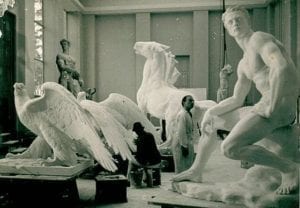
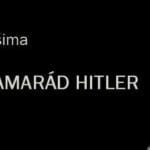
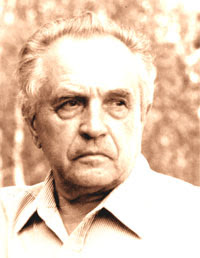
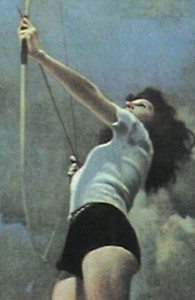
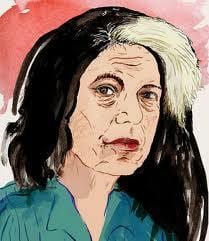
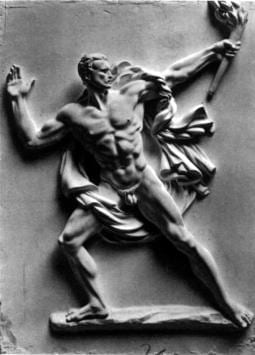
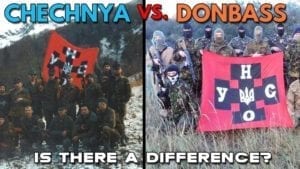

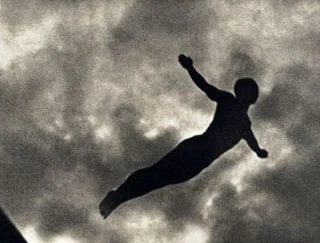 ***
***
Nejnovější komentáře